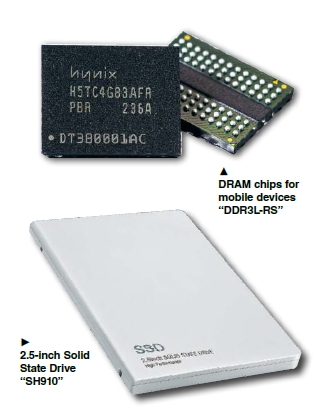SK Hynix, the newest member of SK Group, had been ownerless for more than a decade.
The company, which was established as Hyundai Electronics in 1983, acquired LG Semiconductor in 1999 and separated itself from Hyundai Group soon after in 2001.
Since changing its name to Hynix Semiconductor, it has shown remarkable progress.
On top of becoming the world’s No. 2 memory chipmaker, it launched the world’s fastest 128-megabyte graphics memory chip, called double data rate synchronous dynamic random access memory, in December 2002.

That was only the start. The DRAM business kept growing, with it continuously developing the world’s fastest and highest-capacity chips, including those that received Intel’s authorization mark.
The company now has a market share of nearly 24 percent in DRAM, after Samsung.
The year of 2012 was another fresh start for Hynix as SK Group’s strong leadership and growth strategy were expected to add strength to the global chipmaker.
The merger was also expected to allow Chey to push his global drive for the conglomerate, looking for more opportunities outside of Korea.
Although SK has risen to become the No. 3 conglomerate here, much of its business had been done in Korea.
But the chipmaker is an export-driven company that sells memory chips for wireless devices, servers and graphics cards, as well as computers. Overseas businesses took up about 95 percent of total sales in 2011 with the firm being able to establish a global network with 17 different countries.
It also has three chip production facilities ― in Icheon, Gyeonggi Province, and Cheongju, North Chungcheong Province, with another in Wuxi, China.
With SK Telecom becoming its biggest stakeholder, former SK Group chairman Chey Tae-won is jointly leading the company together with chief executive Kwon Oh-chul.
Renamed SK Hynix, the company has been actively taking on mergers and acquisitions under the SK wing.
It signed a contract to take up U.S. controller firm Link_A_Media Devices to strengthen its output in NAND flash, which is widely used in wireless devices such as smartphones and tablet PCs.
SK Hynix further established a research and development center in Italy by taking over Italian NAND flash developer Ideaflash ― a firm composed of 50 R&D experts with at least 12 years of experience ― for next-generation memory chips.
It also made public in June last year that it will jointly work with IBM to develop next-generation PC RAM chips.
“Becoming a member of the SK family made it possible for us to make breakthroughs and go after growth strategies, instead of trying to survive in the fast-changing industry,” said an SK Hynix official. “Investments were injected at the right time and businesses were run flexibly.”
And as part of its long-term expansion efforts, SK Hynix is now preparing to make its next leap into building a semiconductor firm that extends its boundaries into System LSI semiconductor projects.
By Cho Ji-hyun (
sharon@heraldcorp.com)








